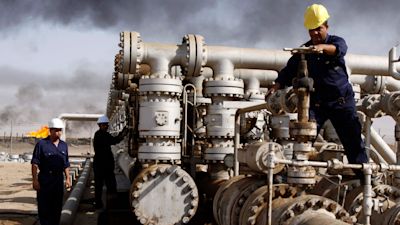World's leading fossil fuel producing countries 'lobby to change key climate report'

Saudi Arabia, Australia and Japan are among the countries attempting to change a landmark climate report ahead of the COP26 climate summit, Greenpeace journalists have said.
Unearthed, an investigative team working for the environmental non-profit, said it had seen documents in which a number of nations and organisations lobbied the UN to "water down" the need to reduce fossil fuel use.
The report comes days ahead of the COP26 climate summit - twelve days of crucial international climate negotiations in Glasgow.
What are the report's key findings?
Australia, Japan, Saudi Arabia and the Organisation of Petroleum Exporting Countries (OPEC) are lobbying the the UN's International Panel on Climate Change (IPCC) to remove or weaken a key conclusion that the world needs to rapidly phase out fossil fuels, the report said.
Brazil and Argentina "two of the world’s biggest producers of beef and animal feed" have been "pressing to delete messages about the climate benefits of promoting ‘plant-based’ diets and of curbing meat and dairy consumption".
Australia, Saudi Arabia, Iran and the OPEC advocated for emerging technologies aimed at capturing and storing carbon dioxide. Unearthed argues that currently, only one power station in the world successfully captures some of its carbon emissions.
What are the chances the IPCC will change its report?
IPPC authors are able to - and have in the past - decline suggested changes to their drafts if the comments are not supported by the scientific literature.
According to Unearthed, a spokesperson for the IPCC said the processes it used for preparing and drafting reports were “designed to guard against lobbying – from all quarters”.
What impact will the report have on the fast-approaching COP26 summit?
The UN's COP26 will run from October 31 to November 12.
The event - which will involve thousands of government representatives, businesses and citizens - has a "unique urgency" amid he worsening climate crisis, the UN has said.
Unearthed argues that any attempts by global powers to change the IPCC report will likely "raise questions about the threat posed to progress at the summit".
The COP27 climate conference - what you need to know
What is COP27? When and where will it be?
What is COP27? When and where will it be?
Each year, the United Nations Framework Convention on Climate Change (UNFCCC) meets at what is called the Conference of the Parties (abbreviated as COP) to discuss the world's progress on climate change and how to tackle it.
COP27 is the 27th United Nations Climate Change Conference of the Parties summit which will be held in Sharm El Sheikh, Egypt from November 6-18.
Who is going?
Who is going?
Leaders of the 197 countries that signed the United Nations Framework Convention on Climate Change (UNFCCC) - a treaty that came into force in 1994 - are invited to the summit.
These are some of the world leaders that will be attending COP27:
UK Prime Minister Rishi Sunak is attending the conference, after initially saying he wouldn't as he was too busy focusing on the economy within his first weeks in office.
US President Joe Biden and his experienced climate envoy, John Kerry, will appear at the talks.
France President Emmanuel Macron will also be among the heads of state from around the world staying in Egypt.
King Charles III will not be attending COP27, despite being a staunch advocate for the environment. The decision was made jointly by Buckingham Palace and former prime minister Liz Truss.
Elsewhere, Russian President Vladimir Putin and his Chinese counterpart Xi Jinping will not attend the talks just as they decided to do for COP26.
What is it hoping to achieve?
What is it hoping to achieve?
1. Ensure full implementation of the Paris Agreement and putting negotiations into concrete actions - included within this is the target of limiting global warming to well below 2C.
2. Cementing progress on the critical workstreams of mitigation, adaptation, finance and loss and damage, while stepping up finance notably to tackle the impacts of climate change.
3. Enhancing the delivery of the principles of transparency and accountability throughout the UN Climate Change process.
Were all comments submitted to the report critical?The majority of contributions in the document seen by Unearthed were "constructive comments aimed at improving the text", it said. What has been the response to the report?
Climate scientist Simon Lewis, professor of global change science at University College London, told Unearthed: “These comments show the tactics some countries are willing to adopt to obstruct and delay action to cut emissions. “On the eve of the crucial COP26 talks there is, to me, a clear public interest in knowing what these governments are saying behind the scenes.”
A spokesperson for the IPCC told Unearthed: “Our processes are designed to guard against lobbying – from all quarters – there’s more on this further below.
"The main elements are diverse and balanced author teams, a review process open to all, and decision-making on texts by consensus.
“This IPCC process is fully transparent, and we routinely publish the preliminary drafts, the review comments and the author responses to the comments, once the report is finalized.
He added: “The drafts of the report are just that – early versions of the report where the authors test out their ideas with each other and then revise them in line with discussions within the IPCC and in the light of the review comments formally received in the IPCC review process and of the continued reading of the scientific literature. “That is why we keep them confidential during the preparation of the reports, so that the authors have the time and space to try out and develop their thinking on the assessment.
"The early drafts are not IPCC reports and should not be considered as such. For that reason we do not get into discussions on the contents of the drafts.”